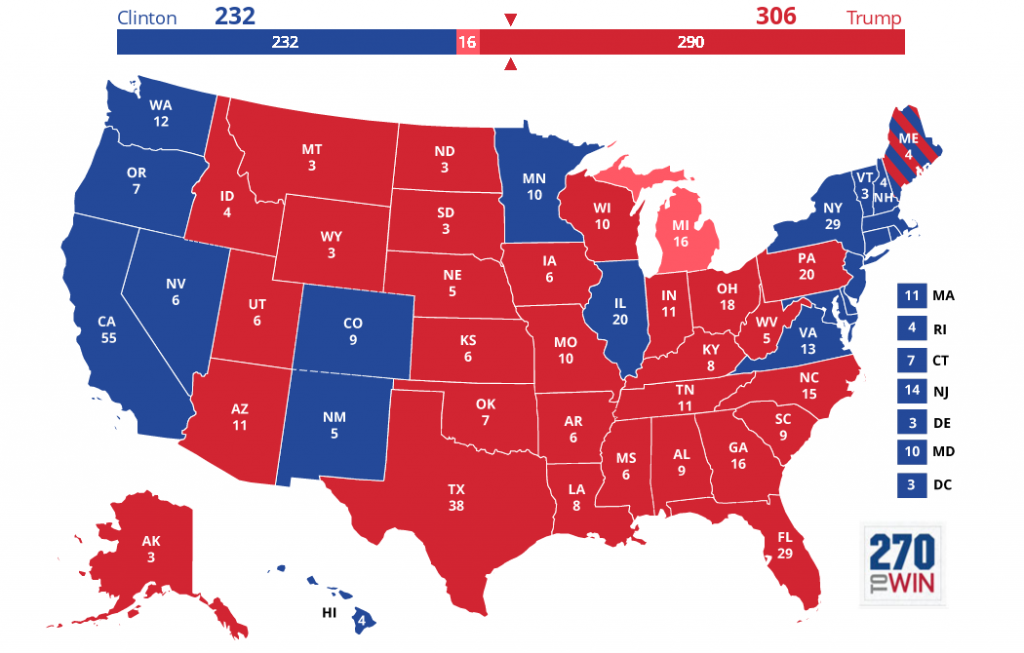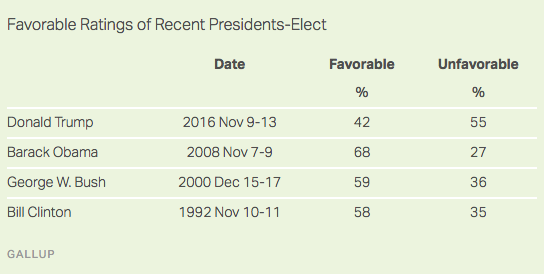The Republican Party is now the strongest political party in the history of this country

Donald Trump’s popularity is on the rise — slightly.
But he’s still likely to be the least popular president ever inaugurated in the history of attempting to measure popularity.

This makes sense because he received fewer votes than his opponent and is only the president because won three states by a margin of just over 100,000 people.
Democrats, meanwhile, hold fewer seats nationwide than they have since before the Great Depression or since Reconstruction, depending on the math, even though they’ve won the popular vote in 6 of the last 7 presidential elections.
How is this happening?
You could argue that the Republican Party is now the strongest political party in the history of this country. And I just did. It’s the sun party to the Democrats’ moon. It controls Congress. In a few months it will control the executive branch and — in a matter of time, and then for decades — it will control the Supreme Court. And that it has concentrated all of this power despite being less popular than Democrats and only representing a fraction of Americans is only a testament to its power.
And the only thing that had been acting as something as a hedge on that power was the fearsome prospect of the ground game the Obama campaign demonstrated by turning out its coalition of women, minorities and college-educated Americans.
After 2016, the GOP’s fear of that turnout machine all but evaporated, even though they got fewer votes.
Trump’s campaign was effective in winning over some Obama voters and turning out new voters, which shouldn’t have been surprising given that numerous structural factors had indicated that this would be a “change” election. He did especially well in areas hit by the opiate epidemic (and the foreclosure epidemic in Florida), which suggests that factors beyond race played in an important role in his win.
If you voted Trump, Trump’s racism had to at least not be a deal-breaker for you. But history has taught us that all sorts of people are willing to get caught up in the thrill of identity movements. And economic pressure — like the permanent anxiety that persists in much of America after decades of globalization and automation salted by the brutality conservative economics — can speed the embrace of, or tolerance for, bigotry.
But what’s often ignored in this story is the effectiveness of the GOP’s multilayered attack on our democracy.
The Republican National Committee seems to have largely caught up with Democrats ground and digital game, and surpassed it with the extra-circular Facebook fakery that helped drive support to Trump, a passionate trafficker of fake news and champion of truther media sites. Any holes in Trump and the RNC’s game were filled in by the strength of strong Senate campaigns in Pennsylvania and Ohio. Trump probably owes his win in Wisconsin to complimentary effects of the Scott Walker machine and the Koch-backed explosion of spending to re-elect Ron Johnson over Russ Feingold, who was the closest thing to Bernie Sanders we saw in the general election. And then there’s Fox News and politicization of the FBI, which ended up competing with Wikileaks in the effort to supplement Trump’s attacks on Clinton with specious evidence.
It’s an awesome array of firepower all concentrated to eek out a presidential victory and total control of Congress in the most important election of our lifetime.
Democrats have their own superpowers with support from the entertainment and digital world built on affinity for liberal social causes and friendliness to the industry policy wise. But the left is by nature less focused and has never seen the sort of concentrated effort the right began in the 1970s to build an infrastructure that professionalized its politics, making “being a conservative” an actual career for hundreds if not thousands of activists masquerading as writers and hosts.
Sure, there’s a shadow of this in Democratic circles, generally built up from legacy publications and efforts of Clinton allies, but it’s Double AA ball at best compared to the pro game on the right. And Democrats have no long-term strategy to deteriorate the right that even resembles what the GOP has pulled off with it’s wars on organized labor and voting.
Republicans barely won, but they beat the odds and now will implement “reactionary Keynesianism” that will unleash a sugar high for the economy, much as Reagan did in the 80s, that will cloak their effort to roll back the few institutions sustaining what’s left of middle class.
Because they didn’t just win a victory in the electoral college. They destroyed any fear they had that Democrats could reignite the Obama coalition without Obama. At least for now.



